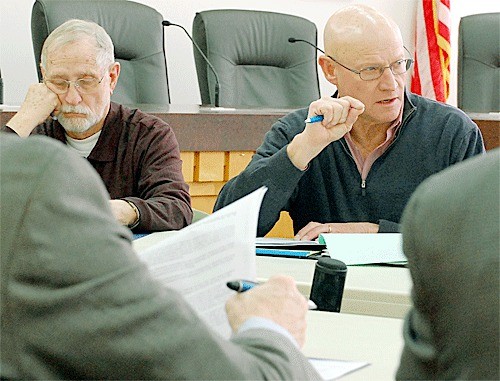A combination of deficiencies in Oak Harbor’s bookkeeping practices resulted in significant financial misstatements in 2010, according to state auditors.
In its audit for the calendar year, the Washington State Auditor’s Office determined the city lacked several internal controls that, when taken together, represent a material weakness in financial reporting.
“We have to make sure we report these issues as a finding,” said Sadie Armijo, audit manager for state’s Bellingham office.
Armijo and three other auditor officials met with the city council, Mayor Scott Dudley, and several department heads at City Hall last week to go over what they found in their annual examination of the city’s books.
They determined the city was missing documentation needed to validate more than $1.6 million in transfers between city funds and was not able to demonstrate it is accurately reporting its liabilities related to a long-closed landfill.
It was also found to have an insufficient review process to prevent or detect significant reporting errors or omissions and lacked adequate policies for the reconciliation, tracking and reporting of city assets.
Although Armijo qualified the results as draft determinations, she said the problems constitute a single finding that will be released to the public on the agency’s website sometime in the next several weeks.
Doug Merriman, city finance director, addressed each of the issues during the exit conference. Concerning fund transfers, one of the problems auditors cited was that some were made based on estimates.
Merriman said it’s a historical practice that has withstood many previous audits without raising red flags. Similarly, the issue concerning the city’s liability for its long-closed landfill, which focused on the lack of documentation for an estimate created in the 1980s, has been reported the same way for years.
However, Merriman said fixes for both problems are already in the works and should be in place for the 2011 fiscal year. The city is also trying to improve its finance statement review process and is looking at a new tracking application that should solve the problems with its asset inventory.
In a later interview, Merriman said he thought that audit was fair and does not resent the finding.
“It improves accountability so it’s not a bad thing,” Merriman said.
In response to a question from Councilwoman Tara Hizon, Kelly Collins, deputy director of state and local audits, confirmed that audit standards are increasingly stringent. And with staff cuts resulting from the poor economy, findings such as Oak Harbor’s are not uncommon, she said.
“We’ve been writing a number of these findings,” Collins said.
But she went on to say that the issue concerning fund transfers required the issuance of a “qualified” opinion, which is unusual. She said this is the first time she knows of that auditors had to do that.
A qualified opinion means that numbers in a financial statement were found to be misstated or contain material errors. Collins said that was discovered in multiple funds.
“It is a little bit of a new territory for us,” she said.
It was also noted in the meeting that two findings issued for 2009 were only partially resolved. Both had to do with a lack of internal controls for cash receipting; one was in the finance department and the other at the marina.
Finally, state auditors said that it did not receive information for this audit in a timely manner and there were instances when city employees didn’t respond to requests.
“There were a lot of situations where people didn’t get back to us or even acknowledge they were working on things,” Armijo said.
It delayed the audit’s completion and drove up the total audit cost from $57,369 for 2009 to $66,847 for 2010. Armijo acknowledged that part of the higher cost can be attributed to an increase in auditing fees.
Councilman Rick Almberg, who noted earlier in the meeting that the increased auditing standards create a ripple effect felt by local government, pointed out that the city didn’t receive such a budget increase.
He expressed concern over staffing levels within the finance department, asking if Merriman had the staff needed to cope with the state’s requirements.
Merriman said he isn’t much of a squeaky wheel and didn’t want to use the forum as a platform to lobby for additional staff. An extra person might help at times but he suggested prioritization might be a better focus.
Also, with the Pioneer Way Improvement Project and staff out sick, this was a particularly difficult year.
“This was the perfect storm of years to have everything go wrong,” Merriman said.



